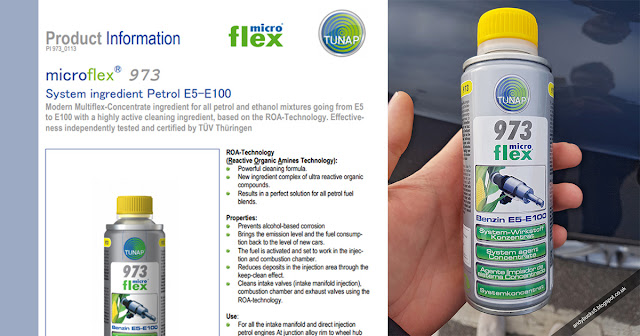
Updated for 2019
What is a Fuel Additive?
How Do Fuel Additives Work?
Best Fuel Additives for the Audi S5 V6
TUNAP 973 / 974 microflex Review
I've been a fan of fuel additives (sometimes called fuel treatments) since using Comma Diesel Magic on my E46 330d, and BMW's own benzin fuel additive on my E92 335i. It was only right then that I find the most recommended one for my S5.
Having read numerous horror stories of products from brands like Redex, I wanted to ensure the treatment I was going to use was recommended by Audi (must be half decent if they recommended it right?)
What is a Fuel Additive?
Fuel additives or treatments are products that you usually add directly to the fuel tank. They usually come in a can with a nozzle so that you can add the whole can just before refuelling, that way it gets a good mixing as you refuel.
Over the course of that tank of fuel the additive will work towards it's claimed purpose, which might be more performance, or cleaning your engine.
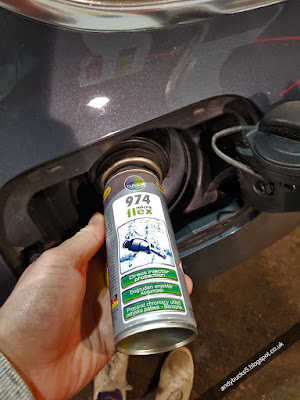
How Do Fuel Additives Work?
Fuel additives aimed at cleaning contain chemicals that react with the carbon build up in the engine, lifting it from the surface of the valves, pistons and injectors where it enters the combustion process and is expelled through the exhaust.
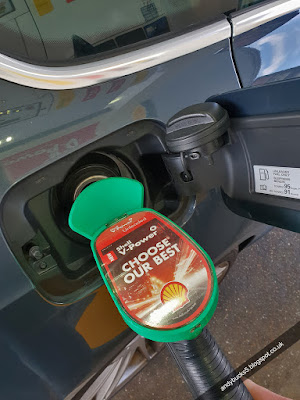
There are also fuel additives to improve performance, these effectively raise the octane level of your fuel and need to be added to each tank of fuel. Really though, I don't see much benefit over just using premium fuel, like Shell V Power, or even race fuel.
Best Fuel Additives for the Audi S5 V6
Based on my research and experience, these the top 3 fuel additives I'd recommend.
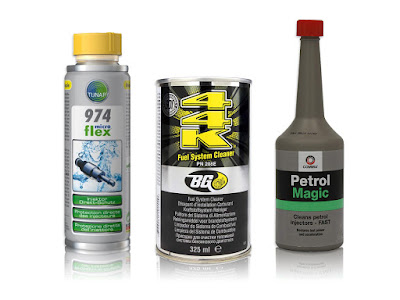
Click the links below to go straight to the Amazon product page and grab a can for your next service.
- TUNAP 974 microflex* - Recommended by Listers Coventry
- BG 44K* - Most expensive - User recommended on forums
- Comma Petrol Magic* - Cheapest - I've had good experience with Comma products
Originally, back in 2017, after a quick chat with my local Audi dealership (Listers Coventry), they recommended I use TUNAP 973 microflex.
However, TUNAP 973 is no longer available (you might find the odd can on eBay but TUNAP aren't producing it any more). The second time I went back to collect a few bits prior to my 60k service, they recommended TUNAP 974*.
TUNAP 974 has replaced 973, it does the same job but according to the Marketing Manager at TUNAP, 974 works a little better than 973. He also said that "979 is a stronger clean if the vehicle is having injector issues or the emissions are too high.
In the interest of fairness, I also had a scan through various forums looking for a general consensus on which fuel treatment, if any, was recommended. It appeared BG 44K* seems to be universally accepted as the best fuel additive out there, many citing they use it in a lot of the Audi and VW dealerships over in America.
Finally, I checked Comma's website to check out their petrol fuel additive, after having a positive experience with their other products.
TUNAP 973 / 974 microflex Review
The all important question then, did adding TUNAP fuel additive make a difference?
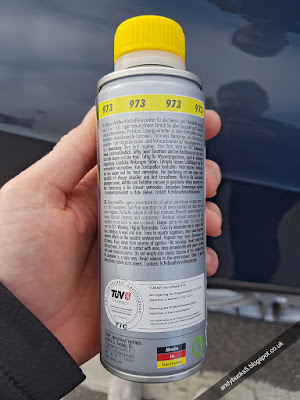
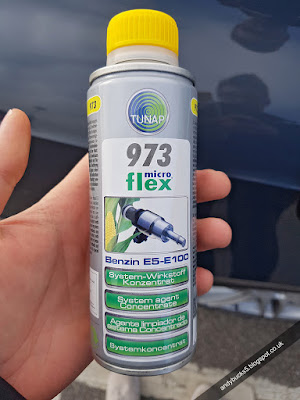
According to TUNAP, they have had the "Effectiveness independently tested and certified by TÜV Thüringen", yep I had no idea who they were either, turns out they are a German company who specialise in product testing and certification. Basically, if they give it the thumbs up, it must be half decent.

Honestly though, I couldn't tell any difference. There was no noticeable change in performance nor fuel economy. There could be a number of reasons why I didn't notice any change; my engine and injectors could have been pretty clean already, or the difference was imperceptibly small, or it plain just didn't work.
I like to think it's my engine being pretty clean (only 50k on the clock at first use), certainly on the second usage as I'd not long had my engine carbon cleaned.
Personally, I'll be sticking to using one can of fuel additive in the tank of fuel before each oil service (every 8000 miles). That way, if any contaminants are dislodged by the fuel additive, and find their way into the oil, they will be removed from the engine during the service.
Let me know your thoughts in the comments, do you avoid fuel treatments like the plague, or swear by them?
If you found this article useful please give it a share using the share buttons on the left and don't forget to follow the blog using the widget in the top right for plenty more content to come!

0 Comments
Post a Comment
Let me know what you think by leaving a comment below.